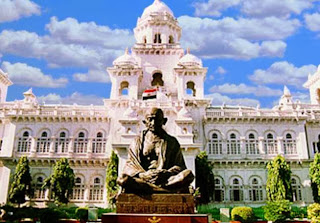By Syed Amin Jafri (Guest Writer)
Both the Houses of state legislature are poised to take up debate on Andhra Pradesh Reorganisation Bill 2013 when the extended session commences on January 3. Assembly Speaker Nadendla Manohar and legislature officials visited Lucknow and Patna to study the process followed by the legislatures of Uttar Pradesh and Bihar to debate the Reorganisation bills. AP Legislative Council is expected to emulate the procedure to be adopted in the Assembly.
Chief minister N Kiran Kumar Reddy has also urged the presiding officers of two Houses of AP Legislature to study the modalities followed by the legislatures of UP, Bihar and Madhya Pradesh for discussing the Bills for the formation of new States of Uttarakhand, Jharkhand and Chhattisgarh respectively. He insisted that the debate on AP Reorganisation Bill shall be in tune with laid-down procedures and past conventions. Other parties like YSRCP and TDP have voiced similar demand for adopting the precedents followed by the Legislatures of these three States.
Both UP and Bihar Assemblies had taken just one day for the debate on Reorganisation Bills. In fact, the discussion lasted just eight hours in UP Assembly and 10 hours in Bihar Assembly. The Legislatures of the three states were given six weeks’ time for debating the bill. But they had reportedly taken 6 weeks, eight weeks and 10 weeks respectively for convening the sessions but the debates were over in a single day and the Reorganisation Bills got their nod.
At the time of formation of AP, the Legislatures of the two states had debated the merger proposal. While Andhra Assembly endorsed the move unanimously, Hyderabad Assembly supported it by a two-thirds majority. The Parliament, too, had discussed the States Reorganisation Bill for 14 days! This was because the SRC Act had redrawn the boundaries to form 14 states and six union territories. Mergers, transfers of territories and formation of new states and union territories took place with effect from November 1, 1956. AP was hailed as the first state to be formed on linguistic basis.
Now, when the bifurcation of AP is on cards, Samaikyandhra activists insist that voting can take place on AP Reorganisation Bill (providing for the formation of Telangana state) and its clauses under Article 189 of the Constitution relating to “voting in Houses, power of Houses to act notwithstanding vacancies and quorum,” which, inter alia, says (1) Save as otherwise provided in this Constitution, all questions at any sitting of a House of the Legislature of a state shall be determined by a majority of votes of the members present and voting, other than the Speaker or chairman, or person acting as such.”
However, Telangana protagonists say that Article 189 (1) is irrelevant in the case of AP Reorganisation Bill for the simple reason that this Bill is placed before the Legislature only for expression of opinion. It is beyond the legislative competence of AP Legislature to take up this bill for consideration and passage since legislation on formation or alteration of states is in the sole domain of the Parliament under Article 3 of the Constitution.
Moreover, putting a question to vote in the legislative parlance means putting the clauses of a Bill to vote when it comes up for consideration and passage in the house. The AP Reorganisation Bill and its clauses cannot be put to vote, unlike the other Bills introduced in the House for consideration and passage. Thus, Article 189 (1) is only an enabling provision with regard to bills within the legislative competence of a State Legislature.
Citing the Presidential reference of the AP Reorganisation Bill to the legislature for expressing opinion, Samaikyandhra activists say that, apart from each individual member of the legislature, the house would need to convey “its” views to the President. This can be possible only by putting the Bill and its clauses to voting. They also point out that the Bill has been “tabled” in the House for its views. Opinion can be rendered on the Bill in various ways, by offering consent or dissent, by supporting or opposing it, or by accepting some clauses and rejecting some other clauses of the Bill.
The mood of the House has to be summed up in terms of number of those supporting or opposing the Bill.
On the other hand, Telangana supporters say that opinions can only be expressed by way of suggestions and objections. The House cannot reject or endorse the Bill, except expressing its views. But it is said that the legislatures of UP, Bihar and MP, indeed, voted on the Reorganisation Bills at the end of the debates.


No comments:
Post a Comment